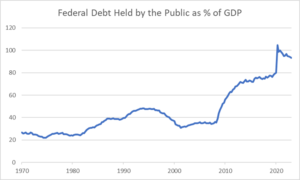U.S. Credit Downgrade
By Cliff Aque, AIF®, CFA®
On Tuesday this week, the ratings agency Fitch downgraded the United States’ credit rating one notch from its highest rating, AAA, down to AA+. This was the first time the U.S. has seen a downgrade since almost 12 years ago to the day, when S&P downgraded it after Congress voted to raise the federal debt ceiling on August 5th of that year. After that downgrade, equity markets were choppy for a couple of months bottoming in early October with the S&P 500 down about 8%[1] before rebounding, but the U.S. fixed income market remained relatively stable. This time around, volatility has hit both stocks and bonds, with the S&P 500 down 1.4% on Wednesday, while the 10-year Treasury has risen to 4.18% as of this writing, the highest since October 2022.
What does this downgrade mean? Not that much. The U.S. is still one of the top-rated countries in the world, only now behind Australia, Denmark, Germany, Luxembourg, the Netherlands, Norway, Singapore, and Switzerland, all of which remain AAA rated by the three big ratings agencies. Fitch’s downgrade was focused less on the actual ability and willingness of the U.S. to pay its debts, and more about Washington’s political divide, cutting taxes too much, and spending too much. Back in 2011, U.S. debt as a percentage of GDP was around 64%, more than doubling during the Great Financial Crisis. Today, it stands at 93% after peaking in COVID[2].
This downgrade may lead to near-term market volatility after a pleasant start to the year, but hopefully serves a shot across the bow of Congress to get the U.S.’s financial house in order. The downgrade in 2011 may have slightly slowed the growth of debt until COVD, but the trend was still moving up. It is not an easy problem to solve, with Social Security, Medicare, and Medicaid accounting for about two-thirds of the budget and only projected to grow. At this time, Social Security’s trust fund will run out in 2034 and Medicare’s hospital-insurance trust fund can only cover benefits until 2031[3]. These problems are not new and have been known to investors, so we would not expect this downgrade to cause much more damage in the markets. The United States remains in a strong economic position, but Congress needs to act sooner than later, which is no small task. As always, we are here to answer any questions or concerns you may have and encourage investors to stay the course through any turbulent times.
[1] Source: Morningstar Direct. Investors cannot invest directly in an index.
[2] Source: U.S. Office of Budget Management via St. Louis Fed.
[3] Source: Wall Street Journal.

